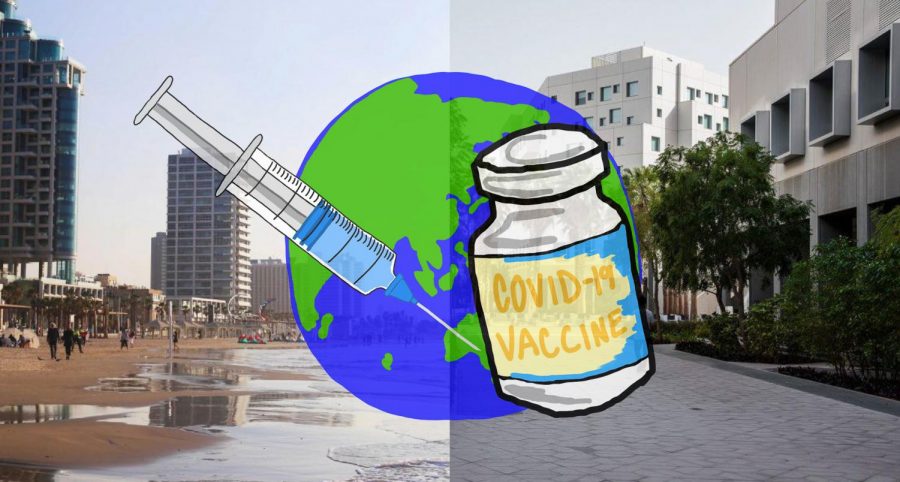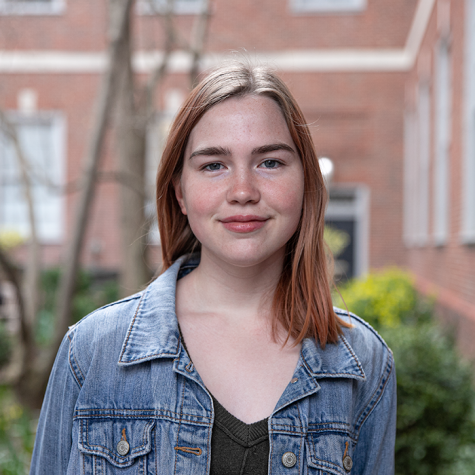New immigration policies and COVID-19 safety measures complicate study away at NYU Tel Aviv and Abu Dhabi
With study away resuming at most of NYU’s global network this fall, many students are facing complex immigration and arrival guidelines amid amorphous — and shifting — pandemic travel restrictions.
Most study away programs at NYU will resume this fall. But students in the NYU Tel Aviv and Abu Dhabi programs face difficulties due to new immigration policies and COVID-19 restrictions. (Photos by Julia McNeill and Sam Klein, Staff Illustration by Manasa Gudavalli)
August 25, 2021
TEL AVIV, Israel — NYU students across the globe are seeking a return to normalcy as they head back to campus this fall. Students studying away, however, are encountering additional hurdles due to strengthened immigration requirements aimed at reducing the spread of COVID-19.
Before boarding their flights, students at NYU Tel Aviv will need to provide a letter issued by Israel’s Ministry of Interior Affairs and approved by the Ministry of Health stating they are eligible to enter the country. The letter, which supersedes the traditional visa process, asserts students will comply with Israel’s COVID-19 policies. Individuals and those associated with higher education institutions need these letters.
“We have excellent connections with the Ministry of Interior Affairs and we are fairly confident that we will be able to have you enter the country ready for the Fall semester,” NYUTA Director Benjamin Hary wrote in an email to accepted study away students in May.
Over 67% of the Israeli population is vaccinated with at least one dose, but the country is experiencing an uptick in COVID-19 cases due to the delta variant. Israel has implemented guidance measures for curbing the spread — including serological tests that check for antibodies — and for mass hospitalizations. Moreover, individuals wanting to enter restaurants as well as many other indoor venues are now required to show their Green Pass, a digital permit serving as proof of vaccination or proof that one has recovered from the virus.
“The idea was you would come in, demonstrate the serological test and you can leave because you are vaccinated,” NYUTA’s Manager of Student Life and Housing Eran Rotshenker said. “Now, it doesn’t really matter if you are vaccinated or not, you still need to be in quarantine. [The serological tests] are only going to be relevant for people to get the Green Pass.”
Current COVID-19 requirements dictate that students must quarantine for at least seven days. To meet these requirements, students must arrive no later than Aug. 28, but no earlier than Aug. 26. Pre-pandemic arrival instructions merely requested students arrive by orientation.
“I hope that this is just a precaution and not seriously the calm before another wave potentially,” GLS junior Asher Moskowitz said regarding the COVID-19 safety measures. “But if this is what it’s going to take to study in Tel Aviv, then I’m willing to do it.”
The new immigration guidelines and logistics of obtaining a Green Pass make for a more complicated arrival to NYUTA than in years past — but this campus is not alone. Josh Taylor, the associate vice chancellor for global programs and mobility service, says many countries have been constantly changing their immigration policies due to COVID-19.
“What’s happening in Israel is just a microcosm of what’s happening everywhere, including the U.S.,” Taylor said.
CAS junior Tyrianne Harris is still trying to understand the immigration process that lies in store for her when she flies to NYU Abu Dhabi. Along with receiving a United Arab Emirates entry permit and travel support letter from NYUAD, she learned by email on Aug. 8 — less than two weeks before her departure — that she would be required to quarantine upon arrival.
“I’m still a little bit confused, especially since I’m supposed to be there on Tuesday and I have no idea what’s going on,” Harris said.
Harris has been struggling with NYU’s communication regarding the immigration process since May.
“I’ve tried to email them and all I get is a vague response that they’re working on it,” Harris said. “They said they had to hear back from the government, which I guess I understand, but I feel like it took a bit long for them to give us a complete answer that they still haven’t given us.”
Taylor believes that despite these difficulties, the return of study away will give students a first-hand glimpse into how the pandemic has affected different countries.
“There are going to be different nuances from site to site, and I think it’ll be really interesting to watch, engage the dynamics between local populations and their governments, local populations and their doctors,” Taylor said. “There’s no other time in our lives that this would have been possible.”
Contact Andrew Califf and Kayla Hardersen at [email protected].

























































































































































